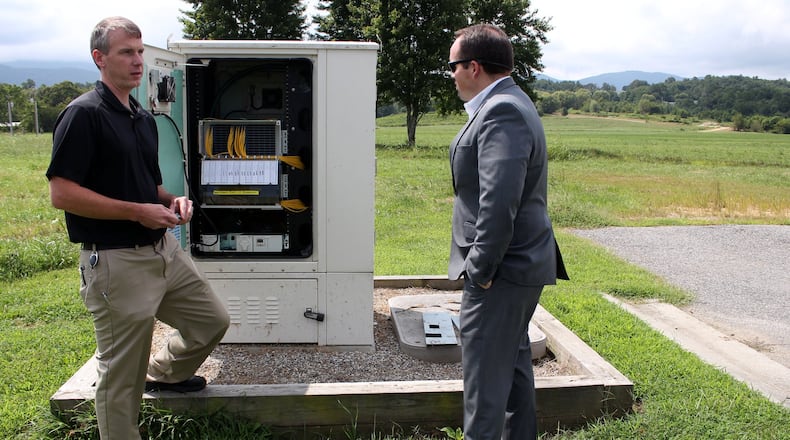A newly released Georgia broadband plan outlines a path for rural areas to get online, a key step toward building internet lines to some of the roughly 1.6 million residents who lack fast connections.
The 14-page blueprint, unveiled this month, could result in internet providers receiving a piece of $600 million in federal money set aside to fund broadband construction in areas that currently lack it.
The plan also calls for the state government to create a map of every location in the state without high-speed internet by sometime next year, an effort that will identify areas that could receive potential future state money.
But internet construction might still be years away. It would likely cost more than $3 billion in public and private investment to wire the state, and so far the only money that’s been appropriated is $2 million for the state broadband plan and mapping effort.
Georgia officials say internet access is essential for the survival of rural areas, where businesses, schools, hospitals and farmers need to be online. While the broadband plan won't fix the problem, it moves the state closer, Georgia Department of Community Affairs Commissioner Christopher Nunn said.
“The solution to broadband in the state of Georgia is not a rifle-shot, one-size-fits-all solution,” Nunn said. “It’s a patchwork that involves many different providers working in partnership to address the needs in various parts of the state.”
At least five rural projects are seeking federal grant funding, and the May 2 publication of Georgia's broadband plan will give those applicants extra points under the U.S. Department of Agriculture's ReConnect Program, Nunn said. The deadline for the first round of grant funding is Friday.
Winning projects could receive up to $25 million each. Federal funding could go to partnerships between internet companies, electric membership cooperatives and local governments. The applicants and areas seeking grant funding haven’t been identified.
Attempts to raise state money for internet construction fell short this year and last year. The Georgia General Assembly had considered levying a 4 percent tax on streaming video and digital downloads, but that legislation didn't pass. Internet companies say they'd need subsidies to make the service profitable in sparsely populated areas.
Without much public money for rural internet so far, the state government has taken the more deliberative approach of planning and mapping the state, as envisioned in legislation approved last year.
“It is a large task,” said Deana Perry, the state’s broadband director. “There are a lot of unserved areas throughout the state that need to have connectivity to be economically competitive with other regions.”
Perry said she’s seen the impact of poor internet access where she’s from, in Chattooga County in northwest Georgia.
When a small business’ internet went down on a recent Saturday, it couldn’t process credit card transactions, she said. Across the state, rural areas have been losing population and businesses to more connected areas.
Besides the broadband plan, Georgia's most significant move toward expanding internet came through legislation that allows electric membership cooperatives and telephone cooperatives to sell online access. It's unclear how many cooperatives will decide to offer internet service.
“The state’s broadband plan is going to make a big difference in helping to bridge the digital divide, but it’s not going to happen overnight,” said Bill Verner, a senior vice president for Georgia EMC, a trade association that serves the state’s 41 electric membership corporations. “It’s a very large challenge.”
While state lawmakers have provided a framework for internet expansion, details of how government grants would be awarded and funded haven’t been decided, said Riley Blount, a spokesman for AT&T.
Legislators have said they could revive the idea of a digital tax, or they could decide to use general tax money without a new funding source.
The broadband plan “takes an important first step to map the current state of broadband in Georgia,” Blount said. “There are key details, including the structure of the grant program, that could be improved by lawmakers and will continue to be discussed.”
Georgia broadband plan
- Map every location in the state to determine what areas lack internet access.
- Create a framework for future government funding of internet construction.
- Provide state assistance to internet providers and local governments.
Stay on top of what’s happening in Georgia government and politics at www.ajc.com/politics.
About the Author
Keep Reading
The Latest
Featured




